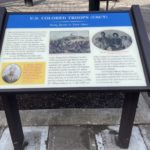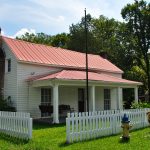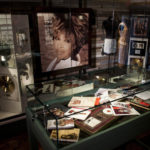February is Black History Month. It was originally created by Harvard-trained historian, Carter G. Woodson in 1925. The celebration was extended from a week to a month in 1976 as a way to honor African Americans for their accomplishments throughout history.
1US Colored Troops Marker
Public Square, Downtown Franklin
In 2019, the City of Franklin, along with a community group, installed in the Public Square four historic markers depicting the African American experience in Franklin before, during, and immediately after the Civil War. A fifth marker, a bronze statue of a United States Colored Troops soldier, will be erected in the Public Square soon.
These five markers tell the story of an old courthouse on the square where slaves were bought and sold, the Battle of Franklin, the US Colored Troop Soldiers, the 1867 race riot that occurred in Franklin and Reconstruction.
2McLemore House
446 11th Avenue North, Franklin
Ex-slave Harvey Mclemore purchased four lots in the Hard Bargain neighborhood in 1880. He built one of the first residential dwellings in the subdivision. The McLemore House is still standing and was owned by a family member from 1800 to 1997 until the joints efforts of Habitat for Humanity and Heritage Foundation purchased the home. Today, the African American Heritage Society uses the museum as a way to promote the historical presentation and educate the public about the black heritage of Franklin and Williamson County. The home is currently under renovation and not available for tours but you can walk by the home.
3Museum of African American Music
510 Broadway, Nashville
The Museum of African American Music recently opened to the public. Anchoring the new downtown mixed-use development Fifth + Broadway, the 56,000-square-foot museum is the only museum in the world dedicated to preserving and celebrating more than 50 music genres and styles that were created, influenced, or inspired by African Americans, including spirituals, blues, jazz, gospel, R&B, and hip hop.
With more than 1,500 artifacts, objects, memorabilia and clothing, along with state-of-the-art technology, each of the museum’s seven galleries is designed to share a different narrative and a unique perspective on African American music and history. We spoke to Dr. Marquita Reed-Wright, Collections Manager for the National Museum of African American Music, learn more here.
4Tina Turner Museum and Flagg Grove School
121 Sunny Hill Cove, Brownsville, TN
Housed inside a one-room schoolhouse, Flagg Grove School is a Tina Turner Museum. The Queen of Rock first attended the school in her hometown of Nutbush, Tennessee, the building was constructed by her great uncle in 1899 and then moved to Brownsville and restored to become one of the largest private collections for Tina Turner. Find more information here.
5Andrew Jackson’s Hermitage
4580 Rachels Lane, Hermitage
On February 27, join the annual Black History Month Memorial Service in commemoration of those once enslaved at Andrew Jackson’s Hermitage, Home of the People’s President, and throughout the country from 11 am to 12 pm. Held at The Hermitage Church, the service will feature music and special remarks, followed by a procession to the slavery memorial. One hundred and fifty flowers will be laid, marked with the names of all those known to have been enslaved at The Hermitage. Admission is free.
The Hermitage also offers select stories from the “In Their Footsteps: Lives of the Hermitage Enslaved” tour free with admission. These 15-20 minute stories highlight the lives of the enslaved men and women who lived at The Hermitage during the life of Andrew Jackson and beyond his death in 1845. Guests will learn how vital their lives were to the operation of the plantation, the harsh reality of the enslaved system and how these men and women endured until gaining their freedom. Included with admission and available through the month of February.























